From bloggers to fitness coaches to restaurant owners, anyone can make a website today with the right tools.

The most popular of these tools — website builders and content management systems — have ushered in a new era of web design. Since you don’t need to code or even know how to code to use these tools, you can build a site without relying on web developers or designers. This has led to a proliferation of websites. Since 2000, 1.8 billion websites have been created.
With more and more individuals and businesses going online, you might be looking for a tool to create or redesign your website.
Let’s say you’re looking to create a site for your restaurant and your main goals are to easily and quickly launch the site, keep costs low, and focus more on design than functionality. Then you’ll probably be better off with a website builder than a CMS.
Below we’ll walk through the process of choosing a website builder and explore some of the top builders on the market. Let’s get started.
How to Choose the Best Website Builder
If you’ve decided that you’d like to use a website builder to create your site, you’ve already significantly narrowed down your selection. But there are still hundreds of options available in the website builder market.
When evaluating different website builders, you’ll want to consider their cost, built-in functionality, and flexibility, among other factors. This will ensure you choose a website builder with capabilities that align with your needs. Let’s take a closer look at these criteria below.
Cost
Budget is an important factor to consider when deciding on a website builder. In fact, it might be your number one criteria for a few reasons. First, it can help rule out options that are too expensive. A website builder that has all the features and extensions you want but is way out of your budget is not the right choice for your site.
Second, budget can also help prioritize what features are must-haves and which are nice-to-haves. You might be willing to to have ads on your site, for example, if the website builder is free. Or you might be willing to pay more for a platform with robust built-in functionality so you don’t have to worry about shelling out cash later for extensions and third-party integrations. That brings us to our next point.
Out-of-the-box Features
When evaluating different website builders, consider their built-in functionality. Does it offer all the features you need? Maybe you’re creating a personal blog and must have an auto-save feature, drag-and-drop editor, and templates designed specially for blogging.
By checking that the website builder offers those features, you won’t have to worry about installing an extension or living without that feature once you’ve built your site. Let’s move on to our final criterion.
Extensions and Integrations
No matter how many features a website builder offers out-of-the-box, it’s unlikely that it will have every feature that every site owner needs for their site. In that case, it’s good to check if the tool offers extensions or integrations with third-party apps. This will ensure that you can add any missing features, like forms and live chat, to your site.
When looking through a website builder’s selection of add-ons, check how many are free and how many are premium. If the add-ons are mostly premium, then you’ll want to factor that into your budget.
Now that we understand some of the factors you should consider when selecting a website builder, let’s walk through some of the most popular options below.
Best Website Builders
- Squarespace
- Shopify
- Hostinger
- WordPress.com
- 10Web
- Wix
- Pixpa
- Weebly
- Dorik
- Duda
- Google Sites
- Ucraft
- Strikingly
- Odoo Website Builder
- Weblium
- Carrd
- Jimdo
- GoDaddy Website Builder
- Webnode
Below we’ll walk through the cost, pros and cons, ideal users, and best use cases for each website builder. We’ll also give each a final grade based on G2 ratings. Let’s get started.
1. Squarespace
 Squarespace is a powerful website builder that offers everything you need to run a business in one place.
Squarespace is a powerful website builder that offers everything you need to run a business in one place.
Pros
Squarespace is one of the most powerful website builders on the market. It offers a vast selection of out-of-the-box features, including audio files support, newsletter signup forms, and more. It also provides blocks for integrating with popular apps, including ChowNow, MailChimp, and Open Table.
Using its LayoutEngine and Content Block system, you can create custom content types and complex multi-column layouts. You can install more than one template on your website and work on multiple designs at once. You can also add custom CSS to any template design using the built-in CSS editor.
Cons
While it’s built-in functionality is robust, Squarespace lacks flexibility, even when compared to other website builders. You can't install plugins or additional modules, so you’re limited to the features Squarespace provides out-of-the-box.
Plus there’s only 60 templates you can choose from to design your site. While you can add custom CSS to make your site look more unique, that will require you to be familiar with coding.
Price
Unlike many of its competitors, Squarespace does not offer a free plan. Its first tier costs $12 per month and comes with a free custom domain for a year, unlimited bandwidth and storage, and templates for quickly building a custom site.
To support more than two contributors on your site, premium integrations, advanced website analytics, and full integration with the platform’s ecommerce features, you’ll need to upgrade to the next tier. The business plan costs $18 per month.
If you’re looking to build and manage a fully-functional ecommerce store that directs customers to a secure checkout page and accepts different currencies, you’ll need to purchase one of the Squarespace commerce plans. These plans cost $26 and $40 per month, respectively.
Ideal Users
Squarespace’s ideal users include artists, fashion designers, photographers, lifestyle bloggers, and entrepreneurs.
Best For
Squarespace is best for portfolios or image-rich sites that offer a small selection of services or products. Keanu Reeve’s site Arch Motorcycle, which features three models of his custom motorcycle, is a great example.

Personal Notes
I have a bit of a love-hate relationship with Squarespace. It's great when you have a smaller team and need to get something up and running with no coding experience, but you can really feel the limited functionality when you're trying to elevate your website to the next level. My team ran into issues creating a blog homepage where we could feature different blogs and categories for SEO purposes like so.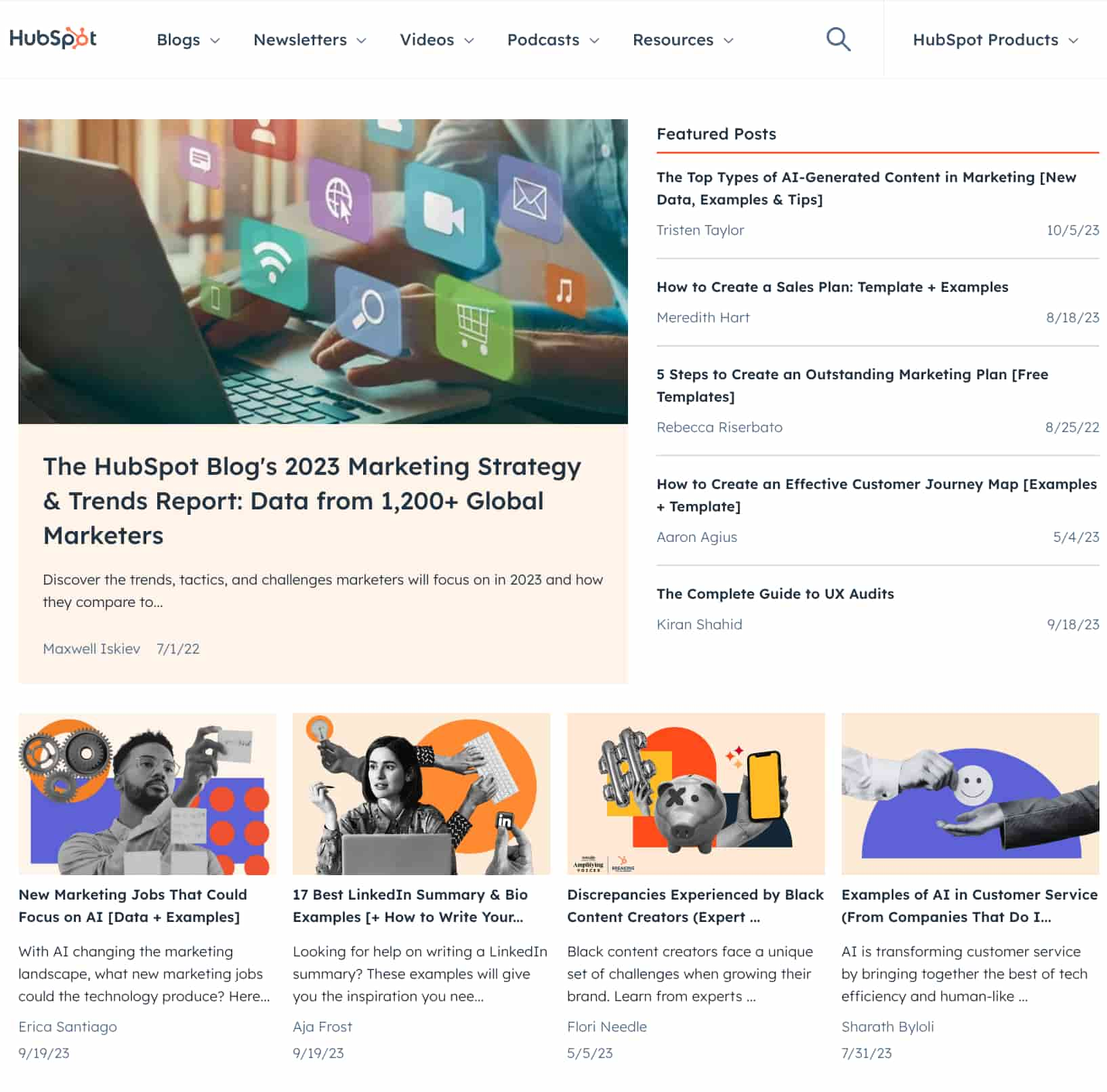
Final Grade
Like G2, we’ll give it 4.4 stars out of 5 for its rich built-in functionality and ease of use.
2. Shopify

Shopify is one of the most innovative ecommerce website builders.
Pros
Shopify has continued to add advanced features to its core offerings over the years. In 2013, for example, it released its own credit card processor called Shopify Payments so store owners didn’t have to purchase and install third-party integrations with Paypal or Braintree. It also added Multi-Currency and Shopify Pay to allow customers to pay with their local currency and save their payment details between Shopify stores for a faster checkout.
At the same time, it has also continued to grow its app marketplace. This avoids adding unnecessary bloat to its core or cluttering up the Shopify editor. With over 5,000 apps in its marketplace, Shopify significantly outmatches WooCommerce and its other competitors.
Cons
The greatest potential drawback to Shopify is price. Its monthly packages are some of the priciest you’ll see on the list. Plus, some Shopify apps and themes also cost money.
And don’t forget about the unavoidable credit card processing fees. While you can avoid transaction fees by using Shopify Payments, if you opt to use a third party credit card processor then you’ll be charged a transaction fee in addition to the credit card processing fee you’re paying the third party processor. These additional costs can add up so it’s critical to plan your budget carefully.
Price
Like Squarespace, Shopify does not offer a free plan. Paid plans start at $29/month and include web hosting, SSL certification, and the option to use a free Shopify subdomain. If you want a custom domain, you can purchase it through Shopify for an additional cost.
Shopify’s lowest tier includes built-in blogging, analytics, customer reviews, ready-to-go payment options for customers, and abandoned cart recovery. For additional seats and other advanced features like gift cards and more reports, you’ll have to upgrade to the next tier for $79 per month. If you need even more seats, analytics, and discounts on payment processing fees, then you can upgrade to the Advanced Shopify plan for $299 per month.
Ideal Users
Shopify is designed for small to medium businesses looking to create and grow their shop.
Best For
Shopify is best for purely ecommerce sites. If you want an ecommerce site and a content site, then you’ll be better off with Squarespace or one of the options below.
Take a look at Cee Cee’s Closet NYC below. Notice how you get a pop-up notification every time a sale has been made. This is just one example of sophisticated functionality on this Shopify website.

Final Grade
Like G2, we’ll give it 4.4 stars out of 5 for its intuitive dashboard and advanced tools.
3. Hostinger Website Builder
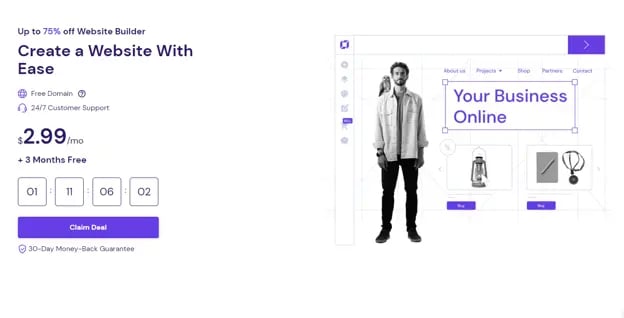
Hostinger Website Builder is an easy-to-use platform allowing you to quickly create a professional website without coding or design experience.
Pros
Hostinger provides a great all-in-solution to build, design, and maintain your website. Their drag-and-drop feature along with designed templates makes it easy for inexperienced marketers and web developers to quickly create a unique and professional website. Hostinger also offers a comprehensive customer support channel 24/7 to provide assistance throughout your design process.
Cons
Hostinger's website builder still has limited customization options which may limit some of your page designs. While their control panel, hPanel, is quite helpful, customers may find it a bit different than the typical website builder which may need some time to get used to.
Price
With Hostinger's Single Plan, you ban build one website with 50GB of storage included for $1.99 per month. It's important to now that this plan does not come with a free domain name which you would need to purchase separately.
For operations with more than one website, the $2.99 per month Premium Plan enables you to build and host up to 100 sites and includes 100GB of storage and a free domain name. Finally, the Business Plan for $3.99 per month backs up your site daily, comes with 200GB of storage, and more RAM than the Single or Premium Plans.
Ideal Users
Hostinger is ideal for businesses and brands hoping to quickly build a website and scale for growth. This is a great option specifically for entrepreneurs, small and medium-sized businesses, and interested bloggers.
Best For
Since Hostinger is ideal for smaller brands, you should consider using Hostinger for online stores and e-commerce, as well as building your own site like a personal portfolio.
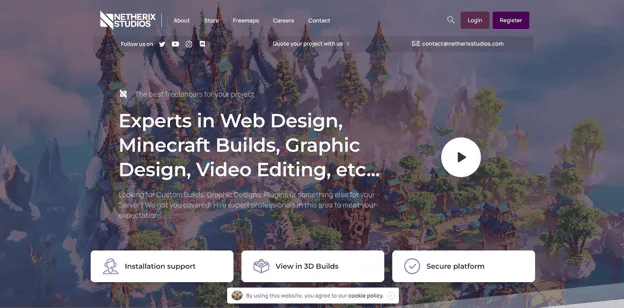
Final Grade
Like G2, we’ll give it 4.2 stars out of 5 for its web hosting services, excellent customer service, and pricing.
4. WordPress.com
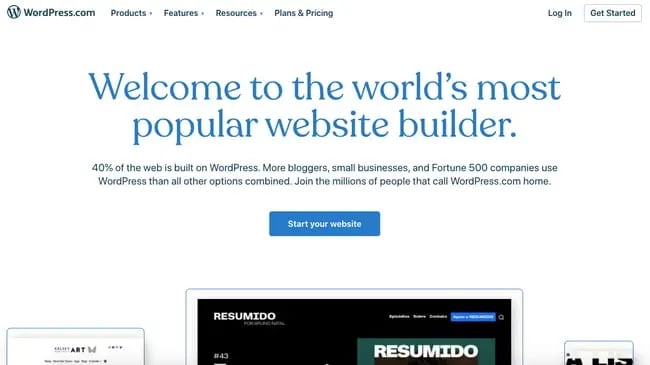 WordPress.com is the free hosting service offered by Automattic, the same company that powers WordPress.org. If you’re confused, read more about WordPress.com vs. WordPress.org before continuing.
WordPress.com is the free hosting service offered by Automattic, the same company that powers WordPress.org. If you’re confused, read more about WordPress.com vs. WordPress.org before continuing.
Pros
Since WordPress was first established as a blogging platform, it offers a rich selection of features, themes, and plugins designed specifically for blogging. This includes built‑in SEO, social media integration, sharing features, and website statistics.
WordPress.com is designed to combine the ease of a hosted solution with the flexibility of a self-hosted solution. At the Business tier, WordPress.com takes care of your site’s updates, security, and performance while also allowing you to install plugins, upload your own custom theme, and choose your own hosting provider. This allows you to focus on creating rich content and visitor experiences without having to worry about the technical aspects of running a site.
Cons
This flexibility does mean that WordPress.com has a steeper learning curve than most website builders. Rather than try to be an all-in-one platform like most of its competitors, WordPress.com is designed to allow users to pick and choose themes and extensions from its own directory as well as third-party marketplaces and sites. The time and effort it takes to research, install, and manage these different pieces can be overwhelming for beginners.
It also requires site owners to flip back and forth between WordPress.com’s clean interface and WordPress.org’s admin dashboard, which can be intimidating for first-time users.
Price
WordPress.com offers a free, ad-supported plan as well as four paid plans. There is a personal plan that costs $4 per month and a premium plan that costs $8 per month. Both plans include an SSL certificate, access to free themes, and some essential Jetpack features for speeding up your site, protecting it from spam, and improving your SEO. The premium plan has some marketing and monetization tools that are best suited for freelancers.
There’s also a recommended plan for small businesses for $25 per month and one specifically for ecommerce stores for $45 per month. Exclusive to these tiers are the ability to install custom plugins, upload custom themes, remove the WordPress.com branding from your site’s footer, and get personalized customer support.
Ideal Users
Ideal users for WordPress.com include bloggers and site owners who are familiar with the self-hosted variant, WordPress.org.
Best For
While WordPress.com can be used to build a business site, portfolio, or online store, it’s best for blogging. Look at how feature-rich Ann Morgan’s blog is below, with her bio, top posts and pages, a categories drop-down menu, and Twitter feed all featured in the sidebar.

Personal Notes
WordPress.com is a great starter service, but if you're looking to take advantage of all the themes and plugins WordPress can offer, we highly recommend WordPress.org. Both platforms might share the name WordPress, but they are quite different in what they offer. The basic rundown is WordPress.org is self-hosted, meaning that you are responsible for finding a hosting provider, which also gives you more flexibility. With great power comes great responsibility.
Final Grade
Again taking the lead from the G2 rating, we’ll give it 4.4 stars out of 5 for its advanced blogging features.
5. 10Web
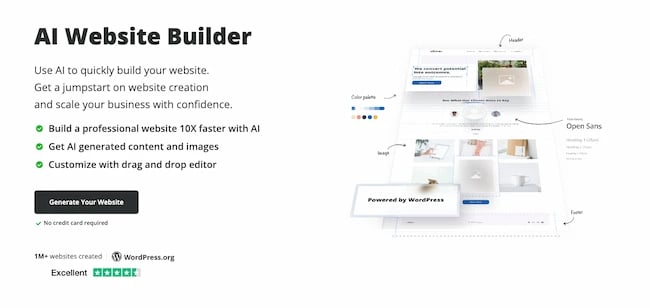
Overall, the 10Web AI Website Builder offers an efficient solution for those looking to create websites with ease.
Pros
The 10Web AI Website Builder is a tool that aims to streamline the website creation process. It incorporates artificial intelligence to simplify website development. By automatically generating content and images, it helps users save time during the initial stages of website building.
What sets it apart is its compatibility with the 10Web editor, which is built on the Elementor platform. This editor allows users to further customize their websites, ensuring a personalized touch to their online presence.
Cons
While the AI functionality of this web builder helps you quickly streamline the website creation process, it may have a narrower range of customization options than other builders. These tools may also offer less control in the design process. And if your business is scaling quickly, you may have some challenges creating complex, advanced, or large-scale web projects.
Price
10Web offers a 7-day free trial. Then, it offers three plans that include its AI Website Builder, alongside many other features. The AI Starter Plan starts at $10/month, which includes 5,000 words in the Elementor AI Assistant. Other plans include AI Premium for $15/month and 50,000 words, and AI Ultimate for $23/month and unlimited words.
Ideal Users
Users who will make the most of this web builder are small to medium-sized business owners, entrepreneurs, and freelancers.
Best For
This website builder is for individuals who want to create a website quickly and easily without coding or design skills. It may also be helpful for users who want a more guided approach to website creation, because this AI tool offers suggestions based on best practices.
Final Grade
Like G2, we’ll give it 4.4 stars out of 5 for its ease of use, user interface, and excellent customer service.
6. Wix
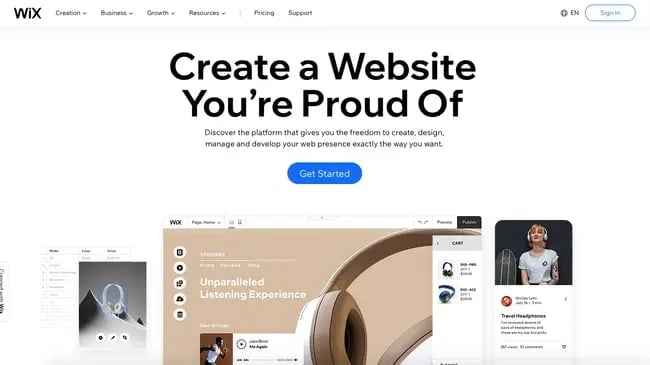
Wix makes it easy for anyone to create a website and manage their business online.
Pros
Wix offers three options for customizing the look of your site. You can choose from over 500 pre-designed templates and then customize it using Wix’s drag and drop editor. You can start from scratch if you know HTML and CSS. Or you can answer a few questions and Wix Artificial Design Intelligence (ADI) will build a personalized website for you. It will include custom text and images, but you can change the text, layout, and style, add more features, and make any other changes you need.
Another pro is the variety of pricing plans Wix offers, starting with its free version. There is also a premium version with specific tiers for individuals, businesses, and ecommerce stores so you can find a plan that meets your unique needs and budget.
Cons
While Wix provides a lot of control over the design of your site, it limits your control over its functionality. For example, you can’t switch templates after your website goes live or add forms or featured images to blog posts.
While there are some advanced elements you can add, like music and maps, you’ll have to add HTML code to do so. This process can be intimidating for beginners and too time-consuming for others. When comparing Wix vs WordPress, for example, the process for installing plugins to add any missing features seems much easier.
Price
Wix offers a limited free plan for individuals and small businesses to build a site. This plan comes with hosting and hundreds of templates and lets you create unlimited pages, but it is ad-supported and assigns you a URL. Your assigned URL will look something like: username.wixsite.com/siteaddress. To provide visitors with an ad-free experience and purchase your own custom domain, you’ll have to upgrade to one of the premium plans.
Wix’s paid plans start at $14 per month. The higher tiers, which cost $18, $23, and $39 per month, offer unlimited bandwidth, more storage, and more advanced functionality, including a built-in integration with Google Analytics.
There are additional plans for business and ecommerce websites, starting at $23 per month. The major difference between this set of plans is that you can accept online payments on your sites. You’ll also get more storage and video hours.
Ideal Users
Wix is ideal for creative professionals, agencies, and small shop owners.
Best For
Wix is best for creating online portfolios and other sites that require more advanced design options than functionality. Take Paolo Azarraga’s portfolio, for example. He uses a full-screen monochromatic video as the background for his homepage and a unique grid display for his other work.

Personal Notes
Anyone who's ever needed to build a website has a soft spot for Wix. Wix is often a person's first website because it's so easy to get started with and use. As we touched on earlier, this does come at the cost of functionality. If you want to customize your website you'll have to familiarize yourself with HTML.
Final Grade
Like G2, we’ll give it 4.2 stars out of 5 for its robust design and pricing options.
7. Pixpa

Pixpa is an all-in-one website builder that makes it easy for anyone to build a professional website and manage their business online.
Pros
Pixpa is a feature-rich website builder that allows photographers and creators to build a beautiful, professional website complete with a built-in online store, blog, and client galleries without any coding knowledge. You can choose from over 150 stunning, pixel-perfect templates that are mobile-friendly and customizable to fit every style and requirement, using Pixpa’s easy-to-use drag-and-drop editor. With preset layouts and page blocks, you can build your website yourself on Pixpa exactly the way you want. In addition to its website building capabilities, Pixpa also offers many other features that can help you grow your business online. With built-in tools such as an online store, blog, SEO manager, marketing pop-ups, announcement bar, and much more, Pixpa gives you all the tools you need to start growing your business today.
Another pro is that Pixpa offers several affordable all-inclusive price plans ranging from $6 to $25 per month based on your specific needs. Discounted 1-year and 2-year plans are also available. All plans come with a 15 days free trial and a 30-day money-back guarantee, so you can test out all their available features before committing to a plan. All plans offer the ability to connect a custom domain name, generous storage space, unlimited bandwidth, and SSL certificates. Pixpa also offers fast and proactive customer support 24/7 via live chat and email to assist you in building your website. Additionally, their help center provides comprehensive guides and step-by-step tutorials to help you get started.
Cons
Pixpa offers a balance between simple and advanced features for building websites. However, it's worth noting that potential users will have to choose from one of their pricing plans since there isn't a free option available. Additionally, the fact that Pixpa doesn't provide a built-in option for purchasing custom domain names might be a downside for some users who prefer having everything in one place. Nonetheless, it's still possible to purchase a custom domain name from a third party and use it with Pixpa.
Price
Pixpa offers all-inclusive pricing plans that cater to different needs and budgets. All plans come with a 15-day free trial, so you can test out all their available features before committing to a plan.
The pricing plans range from $6 per month for the Basic package to $12 per month for the Creator package, $18 per month for the Professional package, and $25 per month for the Advanced package. Discounted annual and 2-year options are also available. All plans offer generous resources, unlimited bandwidth, SSL certificates, and 24/7 support. See pricing at: https://www.pixpa.com/pricing.
The Basic plan is the most affordable option and is suitable for those who only need a basic online portfolio, while the Creator, Professional, and Advanced plans offer more features, storage, and support for those who need a more advanced platform.
It's also helpful to know that Pixpa offers discounts for students and for those who choose to pay for their subscription annually. Every plan includes web hosting via Amazon Web Service (AWS). If you sign up for the annual plan, you also get one year of free domain registration. All of the plans come with a 30-day money-back guarantee and 24/7 customer support.
Overall, it seems like Pixpa offers a good range of pricing options and features for those looking to create an online portfolio or store.
Ideal Users
Pixpa is ideal for photographers, artists, designers, creative professionals, and small business owners.
Best For
Pixpa is an excellent choice for anyone looking to create a stunning professional website without any coding knowledge. With its user-friendly interface and all-in-one platform features such as eCommerce tools and integrated blog option makes it a great platform for small businesses as well as photographers or creators.
Final Grade
Like G2, we’ll give it 4.7 stars out of 5 for its pricing and customization options.
8. Weebly
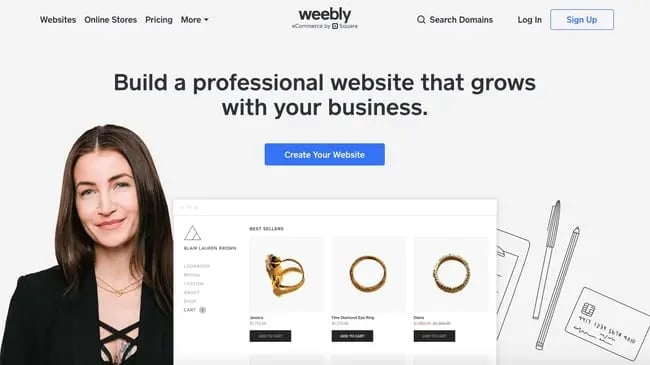 Weebly is designed to simplify and automate many of the tasks that go into creating and managing a store online.
Weebly is designed to simplify and automate many of the tasks that go into creating and managing a store online.
Pros
Weebly offers the core features you need to get started — from hosting to design tools to analytics — and much more. Not sure how to photograph your products? You can ship them to the Square Photo Studio and eCommerce experts will take photos for you based on best practices.
Want to make extensive edits to a template? You can use Weebly’s built-in code editor to customize your site’s HTML and CSS right in your dashboard. This is an excellent feature considering that Weebly offers a more limited selection of templates than some of its competitors.
Cons
One of the biggest drawbacks of Weebly is its lack of SEO features and extensions. You can optimize your titles, meta descriptions, and custom URLs for search and use any template to build a responsive site — but Weebly doesn’t offer much else beyond these standard features.
The ten SEO apps in its marketplace are pricey and have only been given average ratings. That means that though Weebly offers a comprehensive step-by-step guide for making your site SEO friendly, most of the optimization process will fall to you.
Price
Like Wix, Weebly offers a limited free version that can be used to create business websites, ecommerce websites, and blogs. This includes everything you need to build a site: hosting, SSL certification, blogging and design tools, advanced site stats, and more. But it will display ads and branding for Square (the company that acquired Weebly in 2018) and will require you to use a Weebly subdomain. That means your URL will look something like example.weebly.com.
You can upgrade to the first tier of premium plans for $6 per month to connect a custom domain, but ads will still be displayed on your site. To provide visitors with an ad-free experience, you’ll have to upgrade to the Professional or Performance plan.
These plans are $12 and $26 per month, respectively. With these plans, you’ll get free domain registration for the first year, unlimited storage, and more advanced functionality. Advanced features include password-protection for different parts of your site and a shipping calculator for ecommerce sites.
Ideal Users
Weebly is ideal for first-time shop owners and start-up companies, who need customer support and resources like Square’s automated product photography as they try to generate and grow their online sales while keeping their cost margins and teams small.
Best For
Weebly is best for creating ecommerce sites with basic functionality but lots of content and images. Check out Alibi Interiors below, a website for a reclaimed wood company that’s run by a husband and wife, for an example.

Personal Notes
Weebly, like Wix is often the first builder tool that beginner website enthusiasts use. If you're looking to put together a free website for personal use and don't mind the 'weebly' in your URL, this is the perfect first-time builder. If you're planning on spending money for the best website possible for you, we'd recommend going in a different direction.
Final Grade
Going with the G2 rating again, we’ll give it 4.2 stars out of 5 for its vast functionality and support for ecommerce beginners.
9. Dorik
Dorik is an AI-powered, all-in-one no-code website-building platform. Anyone can create full-functioning websites in minutes for their personal or business purposes.
Pros
Dorik is an easy and user-friendly website builder that combines the simplicity of no-code design with the power of AI technology. With just a single prompt, Dorik AI can generate a complete website with engaging website copies and pixel-perfect images.
Another advantage of Dorik AI is that you can create your website in any language you want. Dorik also offers more than 100 pre-designed templates and over 250 UI blocks to accelerate website-building. Select one and customize it using Dorik’s easy-to-use drag-and-drop editor. You can even create a site from scratch or import JSON files. Dorik includes a white-label CMS, built-in SEO tools, team collaboration tools, payment integration, unlimited storage & bandwidth, robust third-party integration for automation, user analytics, custom domain support, code export options, 24/7 support, etc.
Cons
Though Dorik comes with robust built-in functionalities, it lacks e-commerce features. You won’t find the Add to Cart or Shopping Cart element in Dorik. Another drawback of Dorik is that you can not switch templates once your site is live.
Price
Like other website builders, Dorik also offers a Free plan. This plan is ideal for beginners or small projects. But your site’s URL will carry Dorik’s subdomain. You have to upgrade to a premium plan to add your custom domain.
Dorik has four premium plans based on custom domain numbers and features. The Personal Plan starts at $15/month (Billed annually) or $19/month (Billed monthly). The Business Plan costs $39/month (Billed annually) or $49/month (Billed monthly). The Agency Plan starts at $239/month (Billed annually) or $299/month (Billed monthly). This plan is designed for larger agencies and provides 25 custom domains. The Enterprise Plan offers unlimited custom domains and extensive customization options.
All the premium plans include Unlimited Storage & Bandwidth and Custom Fields & Collections options. Dorik also provides a 14 days money-back guarantee on all the premium plans.
Ideal Users
The platform is ideal for businesses, entrepreneurs, marketers, web designers, agency owners, freelancers, and individuals who want to create an online presence or grow their business without coding knowledge.
Best For
Dorik is the best website-building platform for a diverse audience. Its no-code, user-friendly design, low learning curve, and popular integrations are a hit among individuals, freelancers, and small and medium-sized businesses. Agencies find advanced functionalities like white-label and multiple custom domains particularly beneficial. Additionally, entrepreneurs and startups find Dorik attractive for its ease of use and scalability, making it a versatile choice for quickly launching and growing online platforms
Final Grade
Like G2, we’ll give Dorik 4.7 stars out of 5 for its ease of use, high customization, pricing and support.
10. Duda
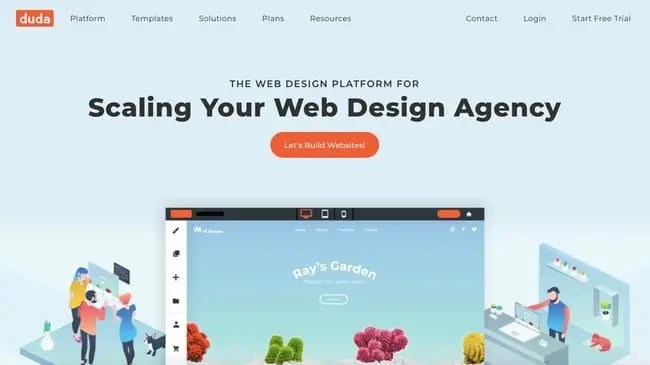
Duda combines powerful team collaboration features with client management tools for quickly building and managing multiple websites.
Pros
Duda offers an array of tools for collecting customer feedback, securing your sites, and reducing time to publish. You can easily import existing content from multiple websites or any structured dataset directly into a template, switch into Developer mode to quickly access a site’s underlying code and then switch back to the interface, and interact with other users using site comments. You can also use Duda’s widget builder to create and reuse widgets across different clients’ sites and create dynamic pages based on one design.
All of these features enable you to have multiple stakeholders working on a website so you can create and launch them faster.
Cons
With so much built-in functionality, Duda’s interface can seem overwhelming. It also lacks the customization options that some of its competitors offer. For example, you don’t have the option to start completely from scratch. There are 10 blank templates in addition to dozens of other pre-designed templates you can choose from, but you’re limited in how much you can customize these templates. You can’t drag and drop elements anywhere on the page like you can with Wix, for example.
There’s also no app store. That means the only way to extend the functionality of your site is to upgrade to one of the more expensive plans.
Price
Duda is another website builder that does not offer a free plan. Premium plans start at $14 per month and include cloud hosting, SSL certification, and email support. This basic plan is will show Duda branding on your login screen and other parts of your site.
To remove Duda branding from your site, have more than one user, and import unlimited content from existing sites, you’ll have to upgrade to its Team plan for $22 per month. Agencies that need up to 10 users and advanced tools like a custom widget builder can upgrade to the Agency plan for $44 per month.
Ideal Users
Duda is ideal for freelance web design professionals and agencies who need to build websites for clients quickly.
Best For
Duda is best for creating small business sites with interactive elements like pop-ups, videos, and promotions. Here's an example of a photography site built on Duda below.

Final Grade
Though Duda has the highest rating on G2 with 4.7 stars out of 5, it has only a fraction of the reviews of the other tools listed above. Because of this and its clunkier interface, we’re giving it a 4.2 rating and listing it as #10.
11. Google Sites
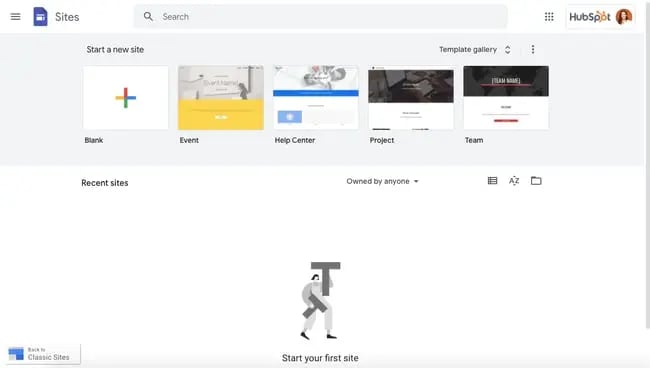
Google Sites is a unique option for creating and publishing a website in ten minutes or less, according to Google's documentation.
Pros
Google Sites is incredibly easy to use. In fact, you can build a site from scratch in six steps— and the process is similar to other website builders. You can start with a template and then add layouts, text, images and videos from the right-hand sidebar.
A unique strength of Google Sites is its collaboration tools. Once you create a site, it's automatically saved to your Drive, where you can invite others to access and edit it. That's why this platform is popular among teams and small businesses that want to create and manage web projects together.
Cons
It's severely lacking in the features and design options you expect from traditional website builders. You can't do much beyond adding text, images, videos, a banner, table of contents, calendar, map, logo, and whatever other widgets are available in the editor.
Its template selection is also much more limited than other website builders'. The templates themselves aren't like the templates you'll find on other website builders. Beyond changing the color scheme and font, they don't change the appearance of your site much. This can make it difficult to create a truly unique site that reflects your brand.
Price
Google Sites is free to use — but does require you to have a Google Workspace account. There are several premium plans available, starting at $6 per user per month.
Ideal Users
Google Sites is ideal for users who already have a Google Workspace account (formerly known as G Suite) for two reasons. First, it's required because Google Sites automatically saves any sites you create in Google Drive. Secondly, it also helps to already be familiar with Google tools and apps since Google Sites looks and feels like Google Forms.
Best For
Google Sites is best for creating internal project hubs and public-facing websites with the help of multiple collaborators. Protection and Control Solutions is a great example of a simple business site built with Google Sites.
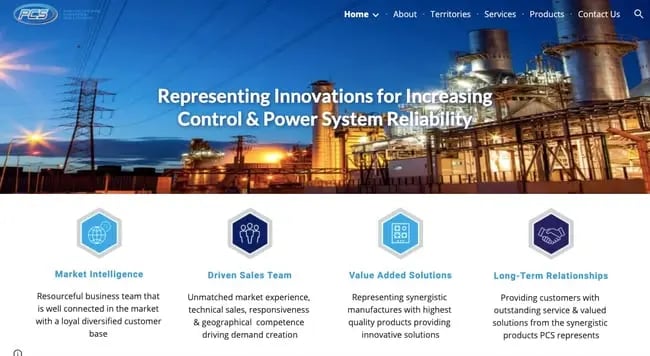
Personal Notes
In case you were wondering, Google Sites does not count toward your Drive storage limit. I've found Google Sites to be limiting in my experience, but if you're familiar with the Google UI it can be a good starter pick to get your feet wet. You won't get to customize your website as much as some of our other options, but you will get to integrate within the Google ecosystem which is a plus.
Final Grade
Like other website builders on this list, Google Sites has a high rating on G2 with 4.3 stars out of 5. But since it has much more limited functionality and design options than alternatives like Squarespace and even Wix, we placed it at #7.
12. Ucraft
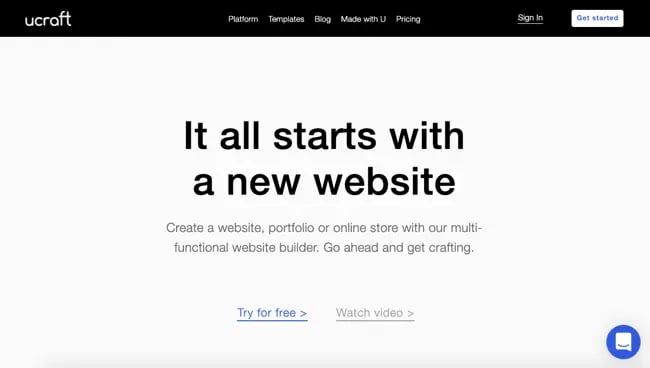
Ucraft is a website builder focused on design. With Ucraft, small businesses and creative individuals can create a beautiful site that represents their brand.
Pros
Ucraft makes it as easy as possible to get started. While you can start with a blank canvas, you’re better off selecting a template from the category that matches your niche (like agency or fashion). These templates are fully responsive so they’ll automatically adjust to fit mobile and tablet screen sizes. Because you don’t need to edit your layouts for mobile specifically, Ucraft can save you lots of time.
Cons
Templates are relatively simple and designed to make your images pop. But if you don’t have high-quality images to show off, then you might want to look for an alternative.
Editing templates on Ucraft is also trickier than on other website builders like Wix. While you can move elements and sections virtually anywhere with the Wix editor, you have to work in blocks with the Ucraft editor. In each block, you can stack elements on top of each other to build out your page — but each element has to stay in its respective block. Header, Footer, Gallery, and Testimonial are just a few of the blocks in Ucraft.
Price
Ucraft offers a free plan with SSL and unlimited bandwidth, as well as premium plans for $10, $21, and $69 per month.
Ideal Users
Small business owners, entrepreneurs, artists, and bloggers will love Ucraft’s drag and drop editor and pre-designed templates.
Best For
Ucraft is best for image- or graphic-rich websites like portfolio and ecommerce sites. Take the website of coffee brand Kaffa as an example.

Final Grade
With 4.6 stars out of 5, Ucraft has a higher rating on G2 than the options above. But it has a fraction of the reviews so we placed it at #8.
13. Strikingly
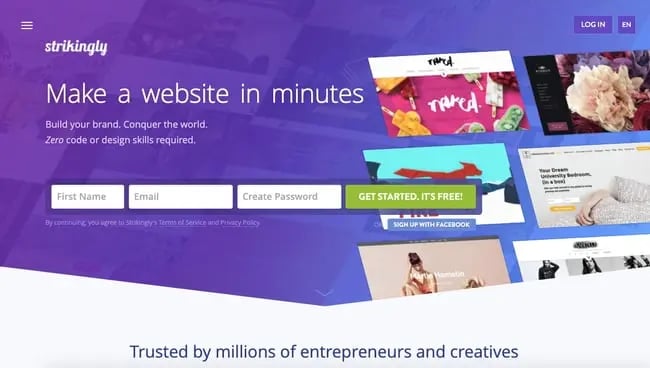
Strikingly is a website builder designed to allow anyone to build a single page website in less than 30 minutes.
Pros
Strikingly offers a drag-and-drop editor, mobile-optimized templates, and basic image editing features so anyone can create a website quickly and easily.
Its editor offers more customization options than you’d find on other one-page website builders, like Carrd. Strikingly also supports several apps, including Pinterest and PayPal. The process of embedding these apps is similar to installing a plugin on WordPress. You can embed a Pinterest board in four easy steps, for example.
Cons
There’s two major cons for using this website builder. The first is SEO. While you can optimize the basics of your site for search — like your title and meta description, it’ll be difficult to get your one-page Strikingly site to rank well. There’s little built-in functionality and no SEO extensions.
The second is pricing, which we’ll discuss in the section below.
Price
Strikingly offers a free plan. However, its free plan is ad-supported, requires a Strikingly subdomain, and does not include an SSL certificate.
For those looking for an upgrade, there are two premium plans for $12 and $20 per month respectively. Since the $12 plan is limited however, you’ll likely have to upgrade to the pro plan. This is expensive compared to other, more feature-rich website builders on this list.
Ideal Users
Strikingly is ideal for entrepreneurs and creative professionals, like illustrators and musicians.
Best For
Strikingly is ideal for creating personal websites or landing page sites for small businesses. For example, film director Michael Wong created a one-page website with a parallax section, image gallery, and embedded video. This is an excellent example of how you can use a free tool to create a memorable website.

Final Grade
Like G2, we rate Strikingly 4.2 stars out of 5 for being one of the most powerful one-page website builders.
14. Odoo Website Builder
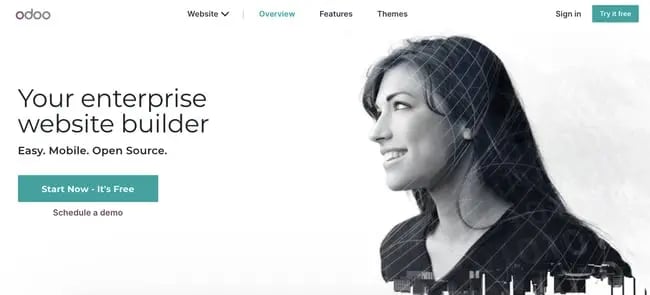
Odoo is an enterprise website builder used by over 5 million people.
Pros
Odoo offers a unique approach to website building. You can begin with the website app and then integrate others —like the core ecommerce app, events, and email marketing — later on. There are hundreds of apps available so you can continue to enhance the functionality of your site as you grow.
You can also create multiple websites, each with their own unique branding, theme, and domain name, and run them from one database.
Cons
While designed to be easy enough for beginners to build a site without coding, Odoo can be too expensive for individuals and businesses just starting out. We’ll discuss this more in the pricing section below.
Some parts of the website — like the navigation menu — can also be difficult to edit.
Price
Odoo has a unique pricing model. You only pay for the number of apps you use and how many users require access. This is unlike other website builders, which provide a few pricing tiers for a range of features —whether you use all of them or not.
Odoo’s website app costs $30 per user per month. Most of the other apps range between $15 and $45 per user per month.
Ideal Users
Odoo is ideal for large or growing businesses who need multiple users working on the same site or need to run multiple websites from one database.
Best For
Odoo is best for creating enterprise-grade websites with sophisticated social media, ecommerce, and other integrations. Take the telecommunications company nomado for example.
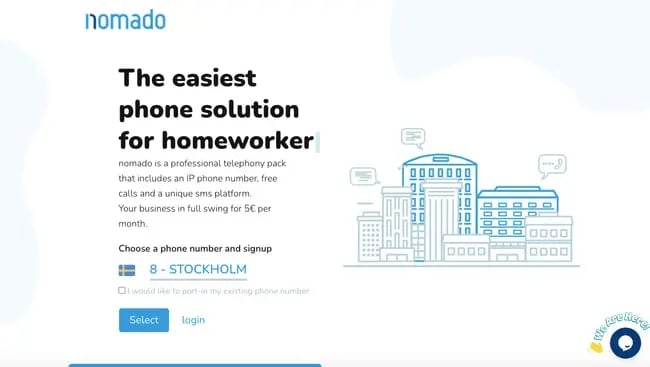
Final Grade
With 4.3 stars out of 5, Odoo has a higher rating on G2 than other website builders. But since it has just over two dozen reviews, we placed it at #10.
15. Weblium
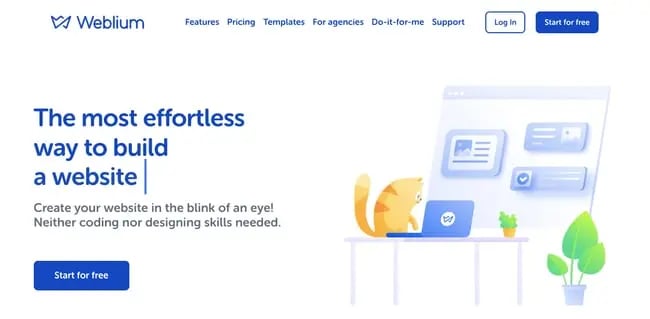
Weblium is a website builder designed to remove the design and technical complexity of building a website.
Pros
To help simplify the design process, Weblium offers one of the largest collections of templates, with over 270 options. It also has a built-in smart design supervisor that automatically adjusts your website’s appearance as you edit the template and blocks. For example, it’ll take care of spacing, line length, font sizes, and more so you can build out web pages faster.
Another unique asset that’ll speed up the design and development process is Weblium’s image library. You can choose from over 100,000 images and graphics to add to your site.
Cons
Weblium is missing some key features and integrations, particularly for ecommerce sites and blogs. For example, there’s no shopping cart feature or supported integration with a CRM.
Price
Weblium offers a free plan that includes the smart design supervisor, access to all 270+ templates, and an SSL certificate. It also offers a premium plan for $8.25 per month or a three-page package for a one-time fee of $196.
Ideal Users
Weblium is ideal for freelancers and marketers who need to create landing pages and other simple types of websites fast — without the assistance of a developer or designer.
Best For
Weblium is best for creating landing pages or simple business sites, like Aurummm.

Final Grade
Weblium has the highest rating on G2with 4.8 stars out of 5. But since it only has a handful of reviews, we placed it at #11.
16. Carrd
 Card is a simple and responsive solution for creating one-page sites.
Card is a simple and responsive solution for creating one-page sites.
Pros
The advantage of Carrd is that it's designed exclusively for one-page sites. That means Carrd’s interface, features, and themes are all optimized for that unique purpose. For example, let’s say you want to make changes to your site. You just have to click on the title or another element and the customization options will appear on the right side of the screen. This makes the editing process much simpler.
Furthermore, because you’re not paying for other features and services you don’t need, it’s much cheaper than other website builders on the market.
Cons
In exchange for this ease of use and affordable pricing, you’ll have to forgo some flexibility and control over your site. For example, you can't change your website name without deleting the whole site and starting over. You can’t add maps or any elements that aren’t supported out-of-the-box. That means you’re stuck with the standard features ( text, images, video, and so on.)
Price
Carrd offers a free plan for building simple, responsive, one-page sites. However, it will require you to use a branded URL and have Carrd branding in your site’s footer.
To remove this branding and connect a custom domain, you’ll have to upgrade to a premium plan startingat $19 per year. Comparing this annual fee to the others’ monthly fees, Carrd is a significantly cheaper alternative to the website builders on this list.
Ideal Users
Carrd’s ideal users are freelancers, photographers, designers, or other individuals that want to promote their work or business.
Best For
Carrd is best for creating any type of one-page site, from personal profiles to portfolios to landing pages. Here's a demo of a personal profile below.

Final Grade
Carrd has a higher rating on G2 than some of the other builders on the list with 4.5 stars out of 5. But since it has the second least amount of reviews, we placed it at #12.
17. Jimdo

Jimdo is a website builder designed to help entrepreneurs and small businesses establish an online presence. Since 2007, over 25 million websites in different languages have been created with Jimdo.
Pros
What makes Jimdo unique is the two different design modes it offers to users. Those who want more control over the design of your site can choose the “Creator” mode. In this mode, you can edit pre-built templates with the drag-and-drop editor like any other website builder.
Those who want to automate most of the design process can choose the “Dolphin” mode. In this mode, Jimdo builds a basic website for you in just a few minutes based on your answers to a handful of questions and resources pulled from your Google and Facebook accounts. The whole process takes less than three minutes.
Cons
When choosing any website builder, you have to forgo some flexibility for ease of use. But this is especially true with Jimdo and the Dolphin mode in particular. You can only make basic changes to your site once it’s been created in Dolphin mode.
Jimdo is also missing some standard features for blogging, password protection, and social sharing. Since there’s no app store, you’re limited to the elements Jimdo offers out-of-the-box.
Price
While Jimdo does offer a free plan, sites built on this plan will not be indexed by search engines. For that reason alone, you should upgrade to one of its paid plans, which start at $9 per month. These plans come with basic features including an SSL certificate and SEO tools.
Ideal Users
Jimdo is ideal for freelancers and entrepreneurs around the world looking to get online to attract prospects or generate more sales.
Best For
Jimdo is best for creating personal websites, portfolios, or small online shops. A perfect example is the website of NUKWAMI, a Rwandan and German artist, designer, children book author, and songwriter. His website allows him to showcase his paintings and illustrations, link out to his playlists, and offer different ways visitors can connect with him (either through the contact form or on social media). He also offers multiple versions of his site (one in English and one in German).

Final Grade
Like G2, we'll give Jimdo a 4.0 star ratingfor offering an automated and do-it-yourself mode for building a website.
18. GoDaddy Website Builder
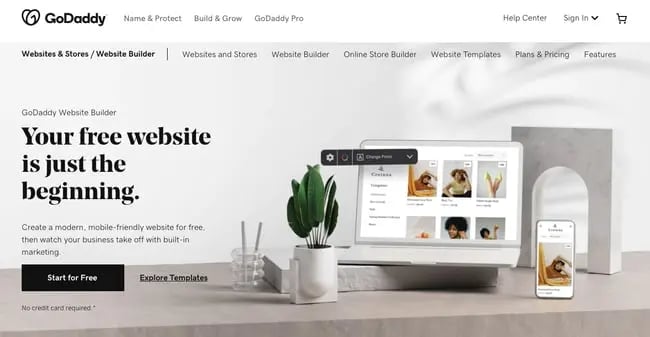
You likely know GoDaddy as a domain registrar, but did you know they also have a website builder? With this tool, you can create a website or online store in minutes.
Pros
GoDaddy Website Builder lets you start small and add more advanced features as you need them. Its free plan includes high-end functionality like email and social media marketing, appointment scheduling, and PayPal payments. It also includes Over by GoDaddy, which lets you create branded visual content without importing it from another app.
You can choose from hundreds of templates that include industry-specific content like text and images. Each template is built on content blocks, which allows straightforward editing even on mobile devices.
There are a range of Website Builder by GoDaddy plans, with each one including additional features (for an additional cost) that are more suitable for growing businesses.
Cons
People expecting a ready-made website might be a little disappointed. While GoDaddy Website Builder can get you most of the way there, the templates need a tiny bit of tweaking to be just right for the individual. And while the free plan does include a lot of advanced features, you need to upgrade in order to connect your own domain.
Price
You can start for free, but once you need to connect your own domain it’s $9.99 a month for a plan that also includes SSL and GoDaddy’s unlimited 24/7 support. Plans at $14.99 and $19.99 per month add SEO and increase capacity for features like email marketing and online appointments. The $24.99 per month plan adds a bundle of powerful ecommerce features.
Ideal Users
With its combined ease of use and advanced features, GoDaddy Website Builder is ideal for solopreneurs. It lets you build a website that can support a growing enterprise, without needing to learn design and technical skills.
Best For
The range of plans at different price points makes GoDaddy Website Builder a good option for growing a business.

Final Grade
The combination of features and value earn GoDaddy Website Builder a 3.9(same as G2).
19. Webnode
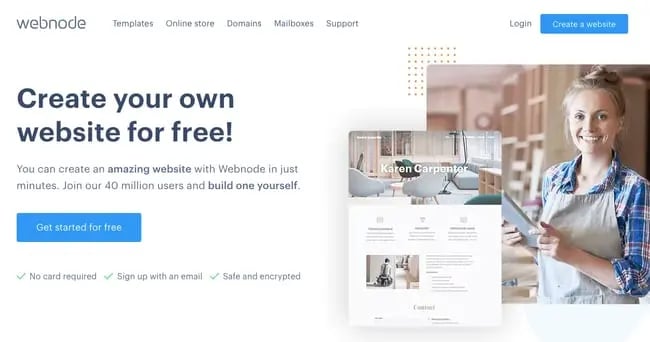
Webnode is a popular website builder used by over 40 million people across the world.
Pros
Like other website builders on this list, Webnode offers a drag-and-drop editor and over 100 predesigned templates so anyone can build a website or ecommerce store without coding.
What sets it apart from other builders is it’s multilingual support. Not only is Webnode is available in more than 20 languages —it also has a multilingual feature that allows you to create different language versions of your website. This allows you to provide a seamless experience for potential customers who are from different countries or speak different languages.
Cons
Webnode has all the basic features you need to create a website or online store —but it’s missing some key features, like a site search box, social sharing icons, and real shipping costs. Since it doesn’t have an app store, you’re limited to the functionality it provides. This can be frustrating for site owners, particularly as their business grows.
Price
Webnode offers a free plan and range of affordable premium plans.
You can build a WebNode site with an unlimited number of pages for free — but your visitors will see ads. To build an ad-free site with a custom domain and more out-of-the-box features, you’ll have to upgrade to one of the premium plans. Website plans are $3.90, $7.50, $12.90, and $22.90 per month, making Webnode one of the most affordable website builders on this list.
Ideal Users
With its responsive design, built-in analytics, and affordable plans, Webnode is a perfect choice for entrepreneurs.
Best For
Webnode is best for creating basic websites and online stores in different languages. For example, We-Eatse is a business site in Dutch. As a food truck and catering company, We-Eatse’s website offers a quick overview of their services, a photo gallery of their food and past events, and a contact form so prospective customers can easily get in touch.

Final Grade
Like G2, we'll rate Webnode 3.8 stars out of 5.
Still haven't found the right website builder for you? Here are five more options in this video.
Website Builder vs. CMS Platform
Website builders and CMS platforms are sometimes conflated, but they offer two very different approaches to creating and managing a website.
With a website builder, you’ll get website building tools and hosting in one place. You can select a hosting plan with the bandwidth and storage you need, purchase your own custom domain, and then select a predesigned template to customize.
Website builders tend to be easy to use, but limited in functionality and flexibility. Not only do they lack the advanced features for managing content and users that you’ll find in a CMS, they also offer a more limited selection of add-ons and integrations to extend the functionality of your site (and some don’t offer any at all). That’s fine if you don’t have the time to learn or use advanced features and add-ons. You’re better off using a website builder than overpaying for a more robust platform with features you’re not using.
Those looking for more customization options, content management features, and extensions can use a CMS.
CMS platforms provide many options for building and extending the functionality of your site. CMS Hub, for example, offers thousands of apps and templates in its app and asset marketplace. From adding interactive elements like live chat and forms to the front end to having multiple users collaborating in the back end, the best CMS systems can provide the built-in features and flexibility needed to improve the experience of your team and your visitors.
However, in exchange for complete control over the look and feel of your site, you’ll have to forgo some ease of use. Since CMS platforms have a steeper learning curve, it will take longer to learn the platform and set up and launch your site. You’ll also have to take over more of the day-to-day management of your site, including maintenance and security, unless you opt for a proprietary CMS like CMS Hub.
Website Builder vs. CMS Platform Analogy
You can think of a website builder and CMS in terms of Legos. Building with a website builder is like building with Legos Duplos: you’re given templates and modules that you can use and customize to build basic sites. These pre-assembled pieces might not meet all your specific needs, but they will make it easier and faster to create a site. That’s why website builders are ideal for creating personal blogs, online portfolios, small online stores, and other sites that don’t require advanced functionality.
Building with a CMS, on the other hand, is like building with Legos Technic. There are still templates and modules you can use, but they’re more specialized and versatile than those of website builders and they’re compatible with most other parts of your site. That means you can create much more customized and advanced sites. As a result, CMS platforms are ideal for creating both business and ecommerce sites with a wide selection of products and services, membership sites, and online magazines.
Now that you understand the major differences between a website builder and a CMS platform, you can decide which one aligns best with your site’s needs and goals.
Finding the Best Solution for You
Whether you’re using any of the website builders above or a CMS, you can create and customize a website for your business without coding. The key to selecting the right solution is understanding what your top priorities are and how the platform’s capabilities align with those priorities.
If you're looking for a platform that will allow you to build and customize a site as quickly and easily as possible, then any of the website builders above will meet your needs. If you're looking for platform that's easy to use but has more advanced functionality so you can grow, you'll need a CMS.
Editor's note: This post was originally published in April 2020 and has been updated for comprehensiveness.











![How to Convert Your Website Into an App [+ 5 Brands That Did It]](https://blog.hubspot.com/hubfs/how-to-convert-website-into-mobile-app.jpg)
